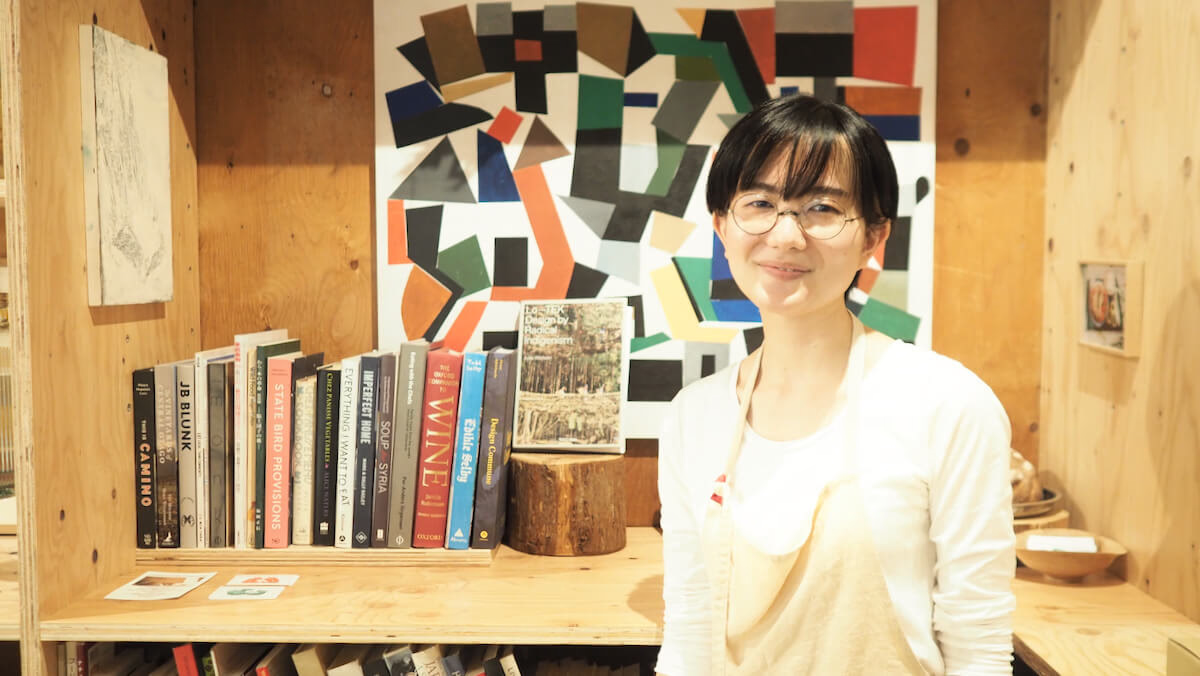こんにちは、フリーランスライターの飛田恵美子です。ものさすサイトで書くのは今回が2回目です。
最初に「ものさすサイトで記事を書いてみない?」とライター仲間の杉本恭子さん・中嶋希実さんから誘われたとき、「モノサスが代々木の古い建物を改装してオフィスの一角にお店をつくったんですよ」と教えてもらいました。
お店の名前は「FarmMart & Friends」。2種類のドーナツと手づくりのジャム、全国各地の顔の見えるつくり手から仕入れた無農薬野菜や調味料が揃う食料品店、とのこと。モノサスで始まった食の事業「MONOSUS社食研」のプロジェクトとして、2022年3月にオープンしたそう。
なんだかおもしろそう、と思いさっそく訪問したところ、小さな店内にはスーパーではあまり見かけることのない、でも思わず手を伸ばしたくなるような食材がずらり。お店の前では買い物に来たお客さんの犬をほかのお客さんが見てあげていて、犬はすっかりその人に懐いてしまい買い物が終わってもなかなか離れようとしなくて......という微笑ましい光景が繰り広げられていました。
なんともいい空気が流れるこのお店、どんな経緯で始まって、何をめざしているのでしょう? プロジェクト責任者の種本寛子さんにお話を伺いました。
種本寛子(たねもと・ひろこ)
1992年静岡県生まれ。良品計画で働いた後、2018年にフードハブ・プロジェクト入社。広報として3年間徳島県神山町に住む。2020年11月から2021年9月までの期間限定で銀座にオープンした「かまパン&フレンズ<ナチュラル物産館>」ではお店の立ち上げに関わる。2021年12月に東京に戻り、「FarmMart & Friends」のプロジェクト責任者を務める。
MONOSUS社食研
2020年よりモノサスの新しい事業としてスタート。『日常の食』を通じて良好な関係性が生まれる場を提供するなど、「Good Food, Good Job! 良い"職"は、良い"食"から。」をモットーに、「働き方」を職と食が共にある「営み方」へシフトさせていきます。
フードハブ・プロジェクト
2014年に徳島県神山町で地域の農業を次世代につなぐために立ち上げました。「地産地食」を合言葉に、育て、料理し、食べる循環をつくるため、食堂「かま屋」、パンと食料品の「かまパン&ストア」を運営。また地域の学校と連携しながら、食育のプロジェクトなどにも取り組んでいます。
神山では、つくるところから食べるところまで全部見えていた
-- まずは、種本さんがモノサスで働くことになったきっかけを教えていただけますか?
種本
転職を考えていたときにモノサスCDO兼フードハブ・プロジェクト支配人の真鍋さんに出会って、食に興味があることを伝えたところ「一度神山に来てみたら?」と言われたんです。実際に行ってみたらその場で「働いてみない?」とお誘いを受けて、1か月後には神山に引っ越しました。
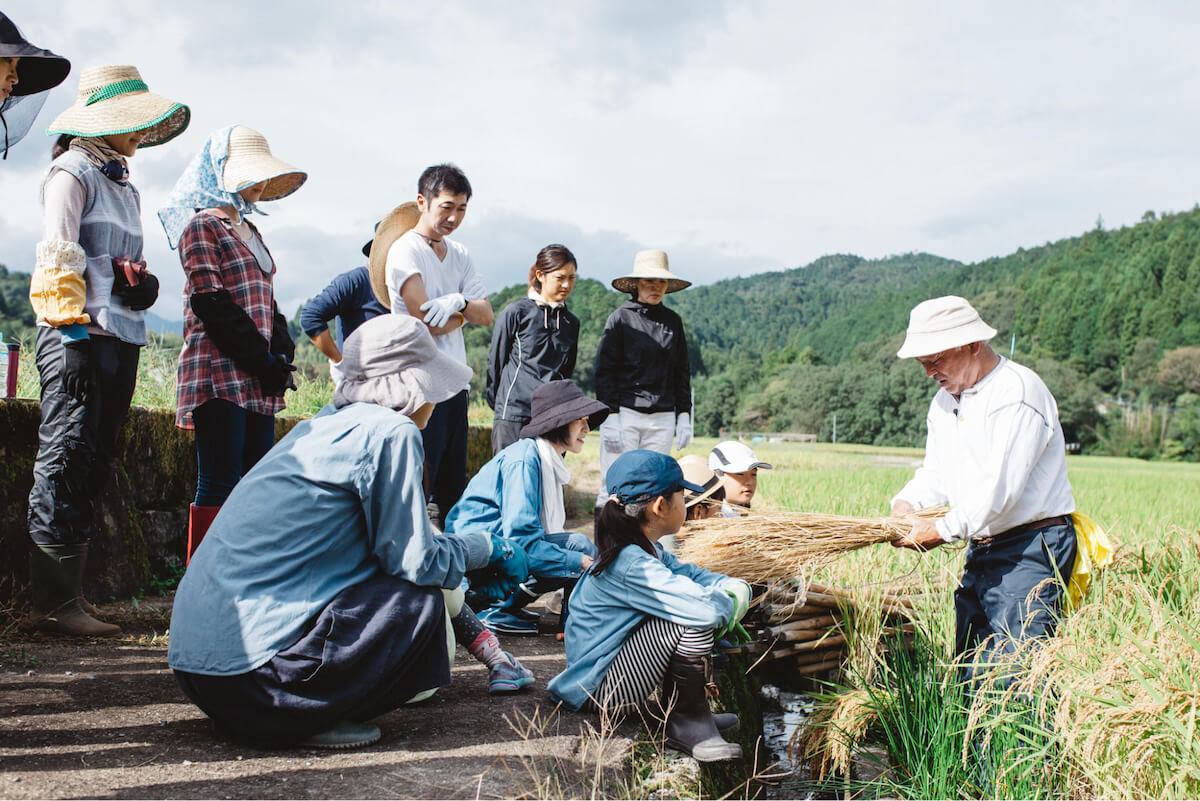
神山町で活動するフードハブ・プロジェクト
-- 神山のフードハブ・プロジェクト(以下、フードハブ)では、「地産地食-地域で育て、地域で食べる-」「小さいものと、小さいものをつなぐ」というコンセプトで少量生産する人と食べる人とをつないでいこうとしていますね。そんな神山での暮らしはいかがでしたか?
種本
フードハブには、農業をするチーム、パンをつくるチーム、食堂を運営するチーム、加工品をつくるチームがいます。地域のおじいちゃんおばあちゃんたちからも野菜を仕入れていて、つくっている人の顔や、お客さんに届くまでの過程が全部見えるんです。ここまで丸見えなのってなかなかないんじゃないかな、と思いました。
野菜や果物はあるときはあるけどないときはなくて、旬をはっきり感じるし、みなさんないときに備える知恵をたくさん持っているんですよね。不自由なところもあったけど、豊かだな、居心地がいいなと感じる場面はいっぱいあって、すごく楽しい暮らしでした。
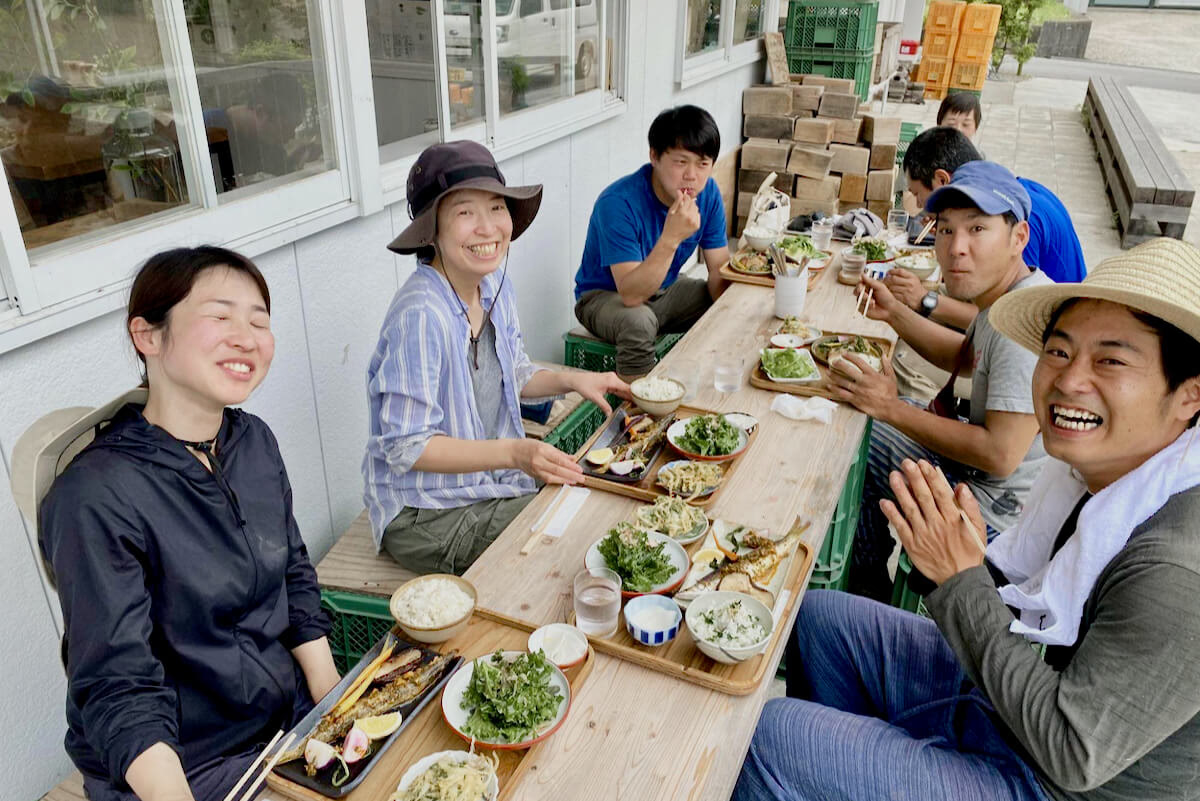
まかないを一緒に食べるフードハブのメンバー
神山でやっていることを東京に持ってくる意味って?
-- モノサスでは、フードハブと連携して、2020年に銀座で「かまパン&フレンズ<ナチュラル物産館>」を期間限定オープンしましたね。このときに「友産友食(ともさんともしょく)-友と育て、友と食べる-」というコンセプトを掲げたのはなぜですか?
種本
コンセプトはみんなで考えたのですが、なかなかしっくり来る言葉が見つからなかったんです。神山の「地産地食」を東京に持ってくる意味というものをずっと考えていて......ただ食材を送ってもらって買ってもらうだけだと、神山での活動と分断があるように感じていて。
でも、「友産友食」という言葉ができたことで、「わたしたちはつくる人でも食べる人でもあり、友達がつくったものを友達に届けるつなぎ役でもある。生産者もお客さんもみんなが輪に入っているような店にしたい」と思えるようになりました。モノサスの東京メンバーが好きなものや食べたいものを仕入れたり、お客さんの地元のものを仕入れたり。そういうお店の姿が浮かんで、みんなで「これで行こう」と。
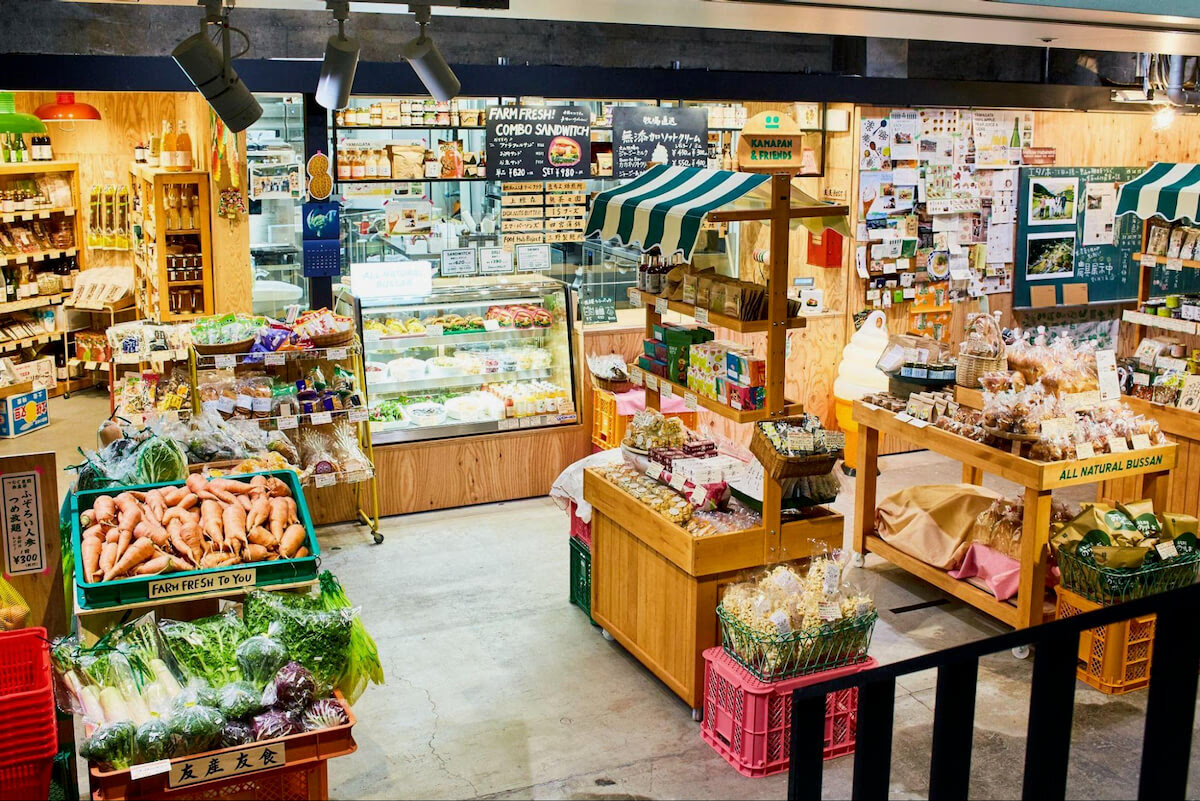
銀座で期間限定で営業していた、かまパン&フレンズ<ナチュラル物産館>
-- 実際にやってみていかがでしたか?
種本
正直なところ、「どうあるべきか」に囚われすぎて、頭でっかちになっていたところがあったなと思います。それによって、お客さんにわかりづらさや堅苦しさを感じさせてしまっていたこともあったんじゃないかな。わたしは立ち上げを終えたあとは神山に戻って後方支援をしていて、夜9時過ぎから店長の弓削ちゃんとオンラインで打ち合わせしながら一緒に悩んでいました。いま振り返ると、「おいしい」とか「楽しい」とか「かわいい」とか、そういうものを入り口にすることが大事だったんだと思います。
一方で、うれしい手応えもありました。野菜が想像以上に売れて、近隣にお勤めの方から「すごく助かる」と言ってもらえて。銀座という都会の真ん中でこんなに野菜が売れるんだ、という驚きがありました。お客さんから「わたし静岡出身で、この食材をずっと使っていたんだけど、東京では手に入らなかったからうれしい」と言われたことも。そういう方は、代々木に移転した後も通ってくださっています。
「おいしいものを買いに行こう」とメンバーがオフィスに来るきっかけになれば
-- 銀座のあと、代々木にお店を移転するのはもともと決まっていたのですか?
種本
いえ、そのまま終わるという選択肢もありました。でも、銀座で得た経験や学び、つながったお客さん、厨房機材なども含めて手放してしまうのはもったいないなと。フードハブとしても、東京の人たちと接続できる場所、全国のつくり手とつながれる場所はあったほうがいいと思っていました。
また、「MONOSUS社食研がやっていることを表現できる場をつくりたい」「モノサスのメンバーがオフィスに来るきっかけをつくりたい」という意図もあります。コロナ禍でリモートワークが進み、メンバーが会社に集まる機会が減ったけど、「おいしいものを食べに行こう、買いに行こう」「クライアントにもオフィスに立ち寄ってもらいたい」と思ってもらえたらうれしいです。
-- 種本さんはFarmMart & Friendsの運営のために神山から東京に戻ったのですか?
種本
そうです。銀座のお店を通してああでもないこうでもないと色々考えてはきたけれど、遠くからそれを続けるより、現場で手を動かしたいと思ったんです。一からお店を立ち上げるというのは自分としてはほとんど経験がないことだし、自信もなくだいぶ迷ったんですけど、銀座のときもたくさんの人に支えてもらったから、チームみんなと一緒だったらできるかもと思い、えいっと飛び込みました。
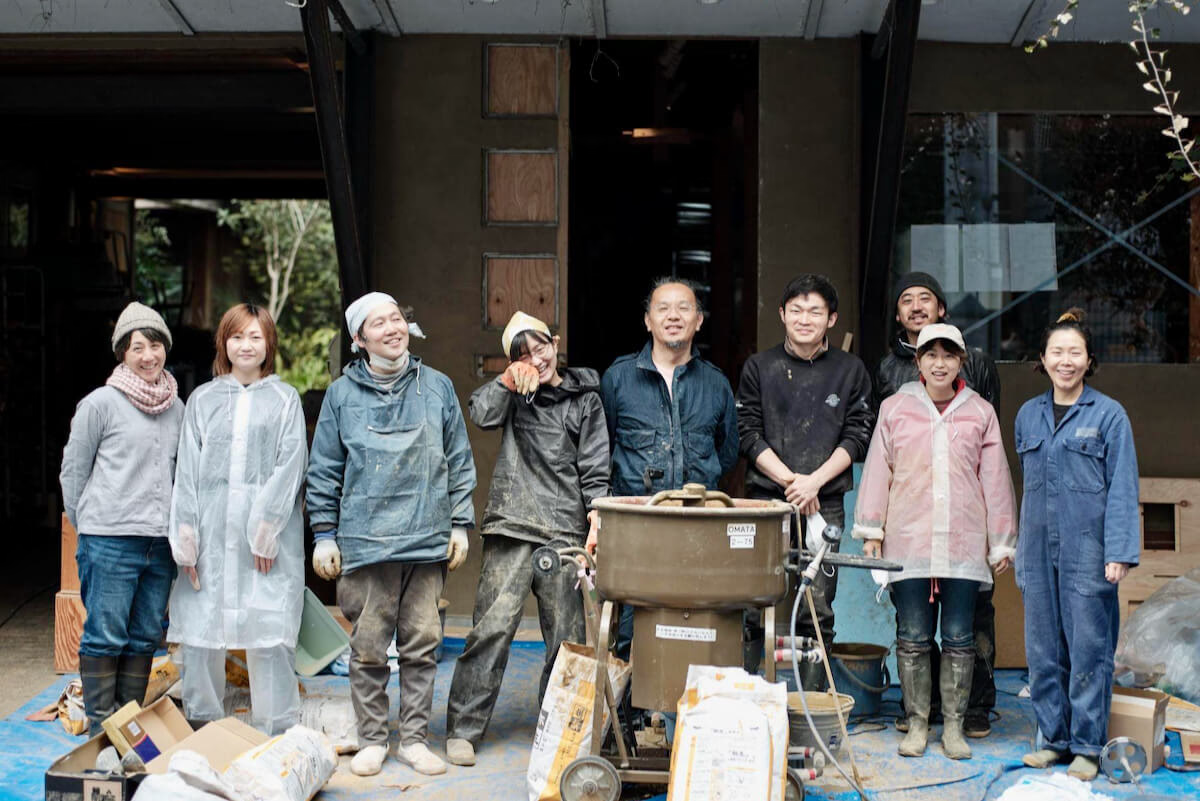
お店の床を施工する日。大工さんだけでなく、設計をしてくれた長坂常さん、店舗の運営メンバーも一緒に床を塗りました。
季節のジャムを入れた超やわドーナツに、毎日食べたくなる雑穀ヴィーガンドーナツ
-- FarmMart & Friendsでは「超やわドーナツ」と「雑穀ヴィーガンドーナツ」をつくって提供していますね。
種本
商品開発をお手伝いいただいたeatrip(東京・原宿)の野村友里さんが、「新しく何かつくるんじゃなくて、神山にはすでにおいしいものがたくさんあるんだから、それを生かしたものをつくるべきじゃない?」とアドバイスしてくださったんです。それでまずは、フードハブのパンチームがかまパンで出していた超やわ食パンの生地をアレンジして、超やわドーナツをつくることに。
ただ、わたしたちスタッフも日々食べるものだから、甘いものだけだとしんどい。しょっぱいものもほしくて、友里さんの提案でおにぎりのような雑穀ドーナツをもうひとつの柱にしました。もともとルヴァン(東京・富ヶ谷)で働いていて、銀座のお店も手伝ってくれていた広瀬恭子さんに開発をお願いしたらめちゃくちゃおいしいものができて、「これなら毎日食べられる、わたしたち生きていける」と思いました。
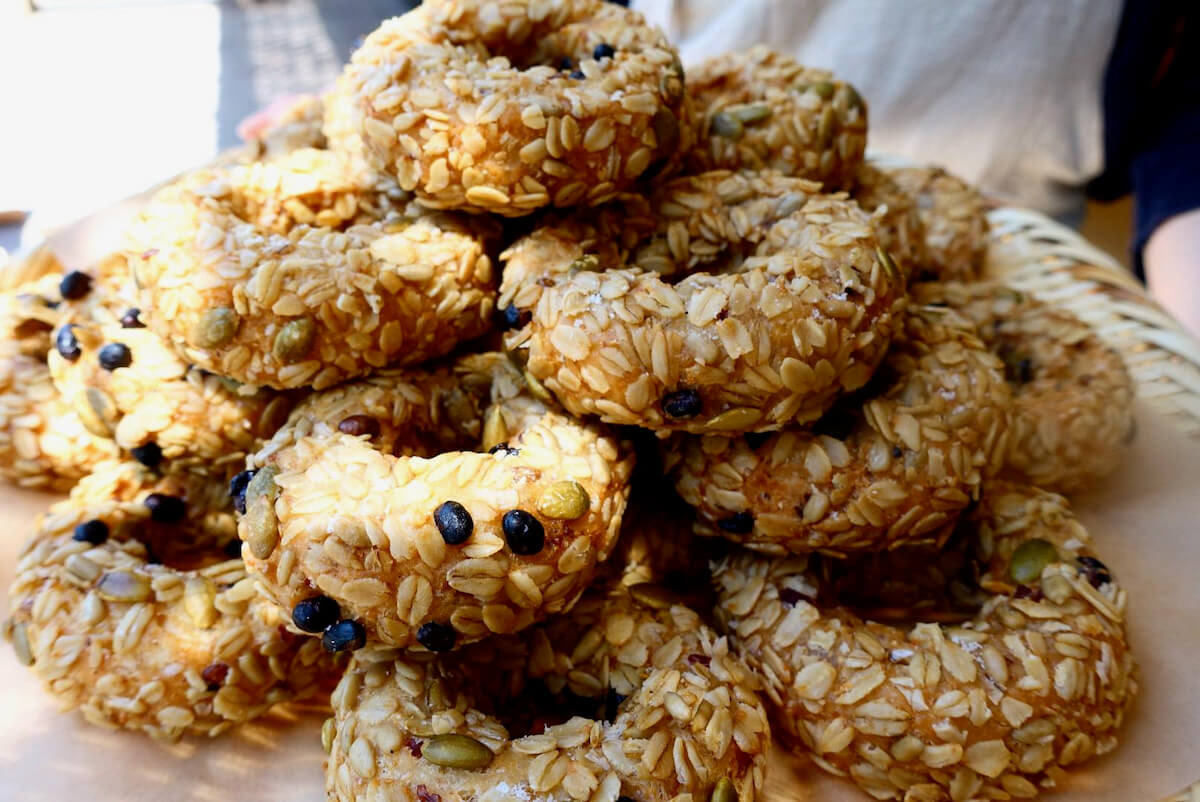
10種類以上の雑穀を練り込んだ、おにぎりのような「雑穀ヴィーガンドーナツ」
-- ジャムもお店で手作りしているそうですね。
種本
つながりのある農家さんが新しくリンゴ畑を持ったからリンゴを仕入れようとか、青梅のビーツがおいしいから野菜もジャムにしてみようとか、顔の見える関係性の中で果物や野菜を仕入れて、お店の中でつくって販売しています。このジャムを超やわドーナツにも入れていて、始める前は散々「甘いものを毎日食べるのはつらい」と言っていたのに、おいしいから実際は自ら進んで食べちゃってます(笑)。
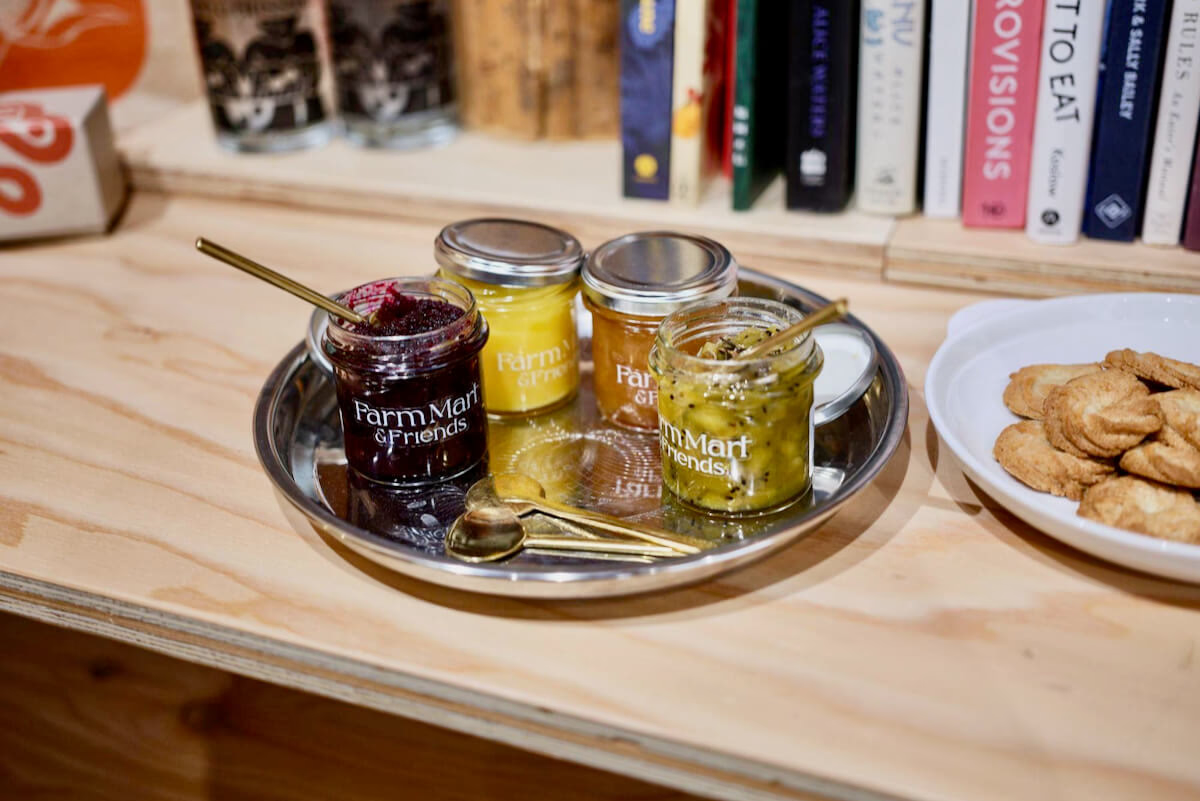
つくり手から届く素材を活かすジャムは季節ごとに変わっていきます。
小さな生産者から小さく仕入れて、顔の見える関係のなかで販売する
-- お店でつくっているもの以外ではどんなものがありますか?
種本
銀座になかったものでいうとお酒ですね。神山や奥多摩、鎌倉、茅ヶ崎など、2週間に1度は新しいビールやワインを入れています。モノサスのメンバーも結構カウンターで飲んでくれるんですよ。生ハムをのせた雑穀ドーナツにチーズや自家製ミックスナッツで、ワインを一杯、とか。
野菜は旬によって変わっていくけど、神山からはフードハブのつなぐ農園や里山の会さん、高知のファームベジコさん、東京・青梅のOme Farmさん、長野のキノコ村さん、千葉の三里塚ワンパック野菜さんなどから仕入れています。
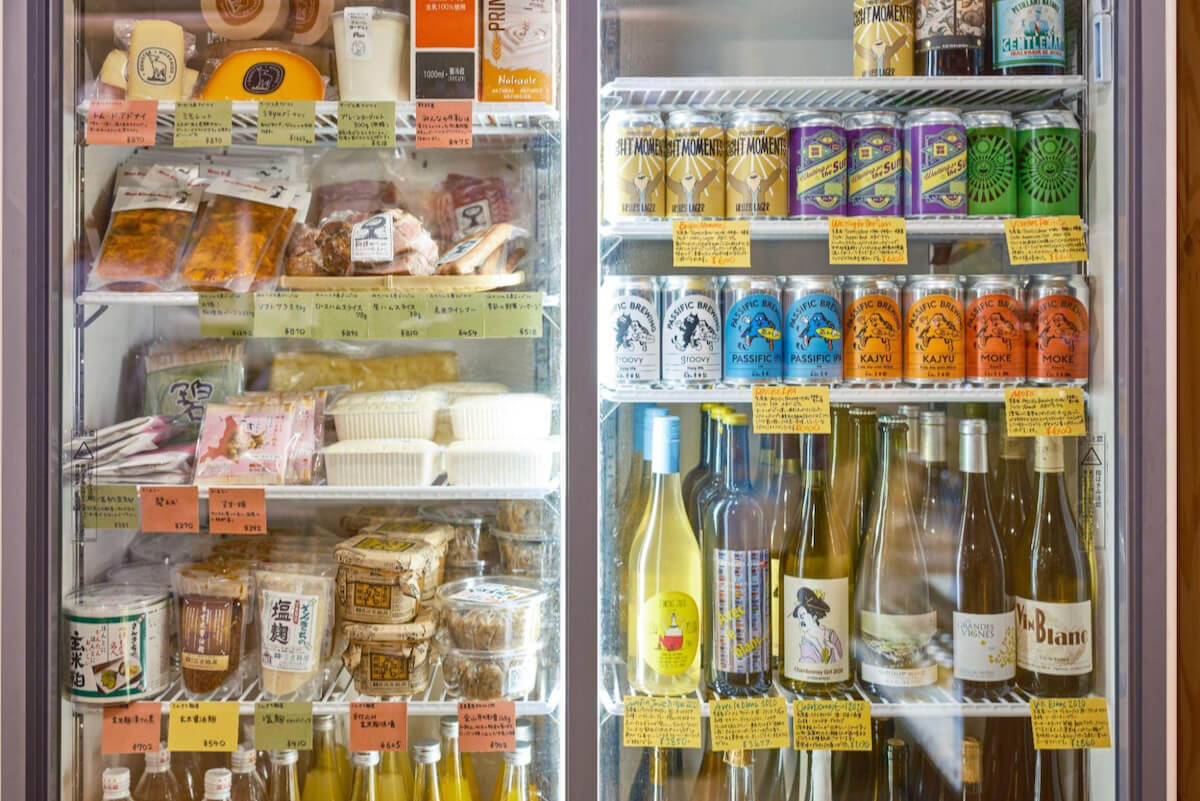
クラフトビールとナチュラルワインは人気商品!
-- お豆腐もおいしいと聞きました。
種本
お豆腐は絶対食べたほうがいいです。東中野にある「小野田豆腐店」というお豆腐屋さんなんですが、豆はもちろんすごくこだわってつくられていて、本当においしくて。最初は「卸売はしていない」と言われたんですが、よくよく聞いてみたら「取りに来てくれるなら販売できますよ」と言っていただきました。コストを度外視しても仕入れたい、みんなに食べてほしいと思ったので、隔週で東中野に通っています。
-- 仕入れの基準や方針はありますか?
種本
オーガニック・無添加の食品を扱う卸業者さんを通すと似たような品揃えになってしまいがちなので、自分たちが見つけた小さな生産者のものを小さく仕入れて小さく販売しています。
と言っても、日本全国を隈なく回って選んだというわけではなくて、FarmMart & Friendsに関わる誰かのおすすめの品など、人のつながりや偶然の出会いが大きいですね。わたしたちがたまたま出会って、本当においしいと感じて、みんなと一緒に食べたい、食べ繋ぎたいと思ったもの。
人から紹介されたものでも、「あると便利だけどなくてもいいな」と感じたものは仕入れないし、同じ生産者からいろいろ揃えるということもしていなくて、「醤油はここの」「お味噌はこっち」といったように、ピンポイントで選んでいます。
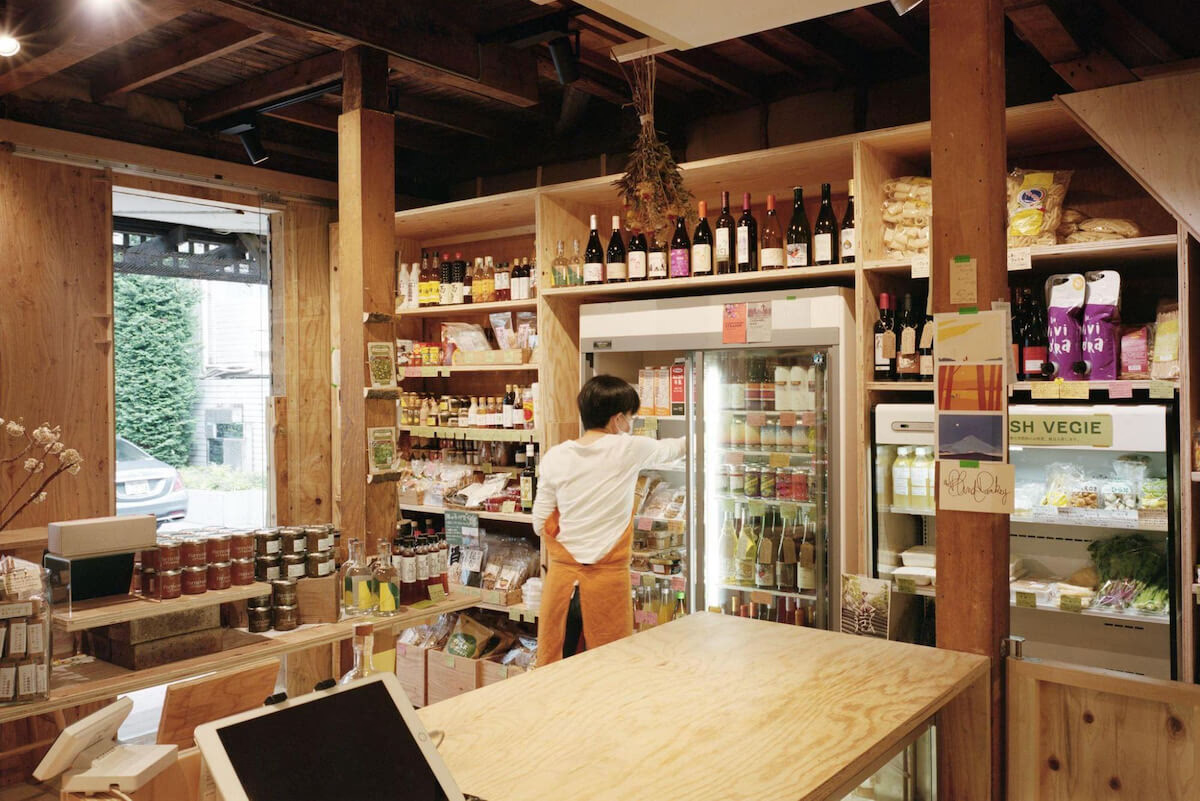
お客さんから「このまちで暮らすきっかけになった」と言われて
-- FarmMart & Friendsでは、「友産友食」というコンセプトを引き継ぎつつ、「代々木の"ご近所"に根ざす」ことを目指していますね。
種本
「食の自治」みたいな話になるのですが、自分たちが食べるものをちゃんと確保して、何かあったときに支え合うには、やっぱり距離が重要だと思うんです。実際にお店を始めて、近所の方から「ここに来れば食べたいものがある」と思ってもらえている感触があります。このあいだ、最近近くに引っ越してきたというお客さんから「このお店とパン屋塩見さんがあったから、わたしたちこのまちでもやっていけると思いました」と言われて。
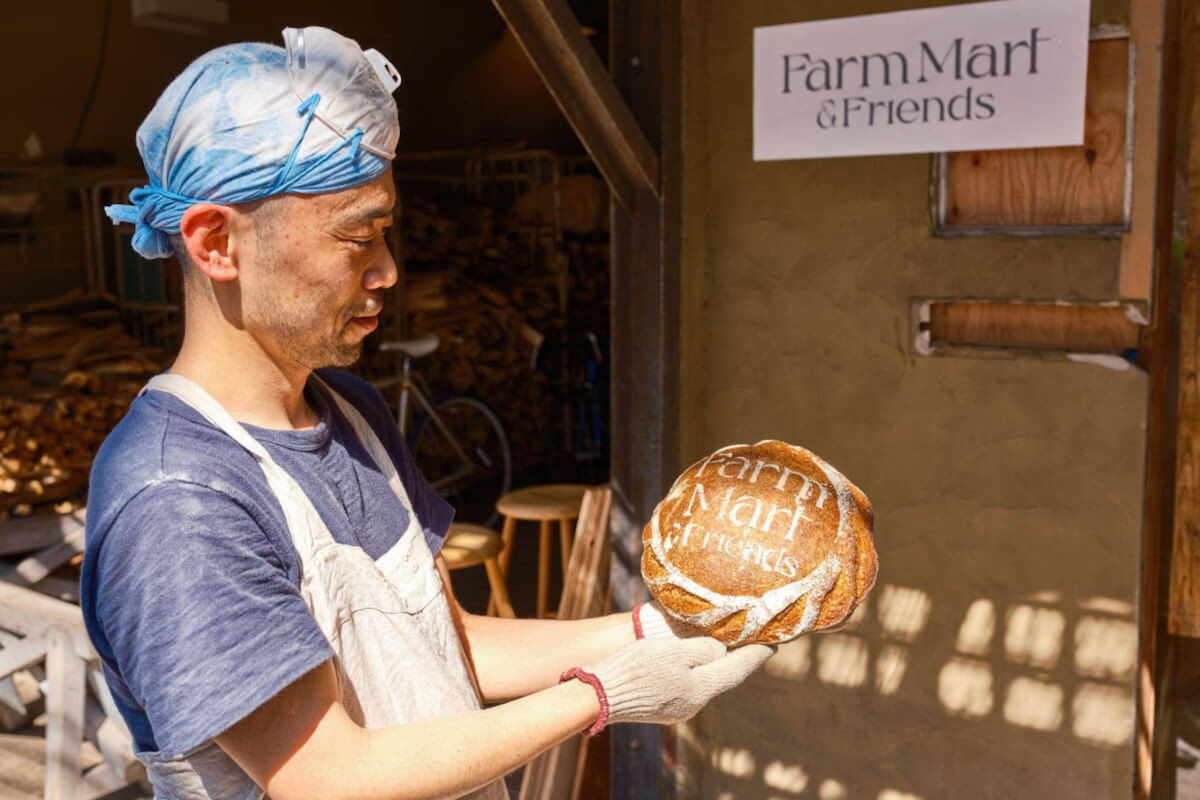
オープンに際して、お隣の塩見さんがパンを焼いてくれました。
-- それはすごいですね。
種本
びっくりしたけどうれしかったです。「商業施設の中にある便利な自然食品のお店」ではなく、「この町で、顔の見える人たちに食べてほしいものを揃えたお店」でありたいと思っていたから。実際に、お母さんと子どもが幼稚園からの帰り道に立ち寄ってくれたり、毎週ワインを買ってくれるサラリーマンがいたり。「Welcome to our neighborhood!」と歓迎してくださった外国人の方もいました。モノサスとしては新しく来たわけじゃなくて、もともとオフィスはここにあったけど......(笑)。
でも、お店を始めたことでわたしたち自身のまちの見方が変わったように感じています。これまでは駅からオフィスに行くまで、どこにでもある住宅街の風景でしたが、「おはようございます!」「いってらっしゃい」「夜は雨降るみたいですよ!」と道すがらでお客さんとお話しする機会も増えて、と、ご近所の解像度がぐっと上がりました。
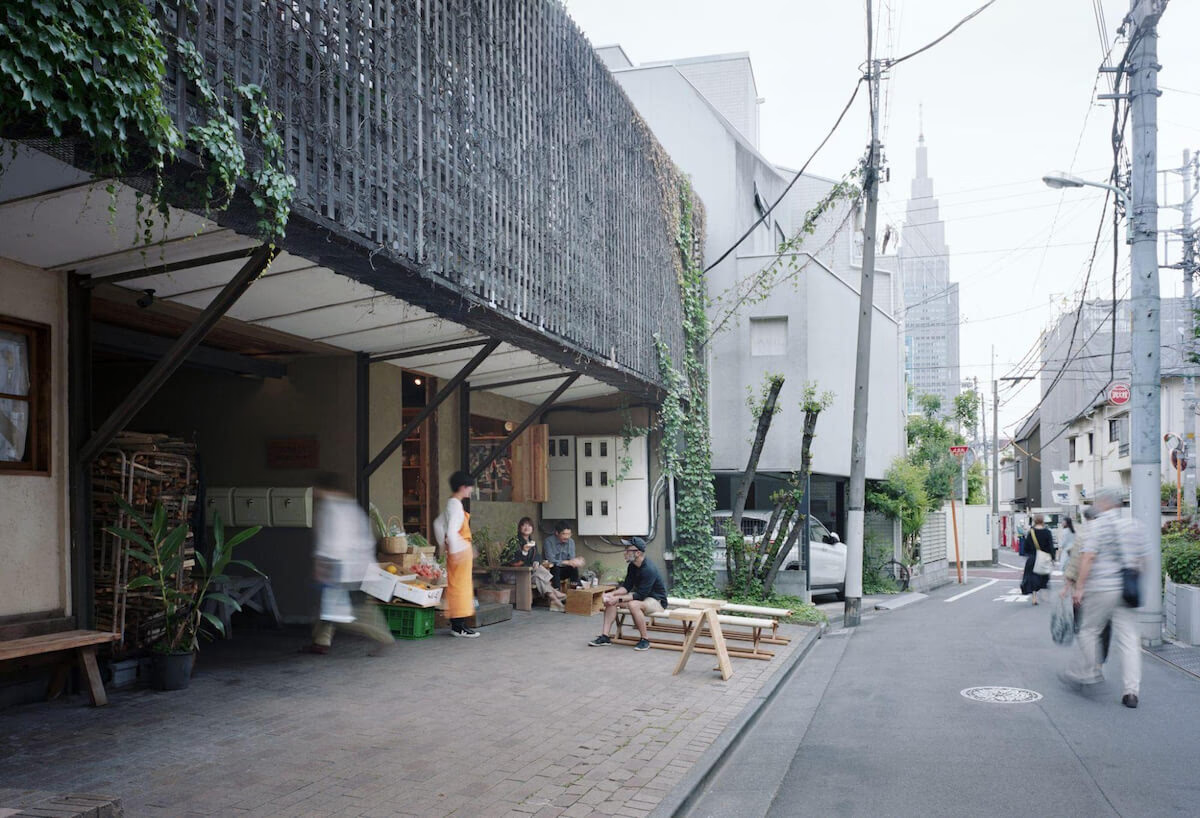
-- 銀座のときとは、違った感触はありますか?
種本
すごくあります。ドーナツめがけて遠くからわざわざ訪れてくださる若い方から、学校の送り迎えや散歩の途中で立ち寄ってくださるご近所の方まで幅広い方が来てくださっています。仕入れている野菜やお酒が当初の予想以上に売れていることも驚きの一つです。やっぱり、コンセプトを全面に出して堅苦しくせず、間口を広くしたのがよかったんだと思います。「紙袋がおしゃれ」とか、「ドーナツがおいしそう」とか、初めての方はそういうところをきっかけに来店してくださいますね。
そのなかで、関心のある方は食材やつくり手さんについて質問してくださるし、何度も通ってくださる方にわたしたちのほうから「これ気に入ってくださったんですね」と話しかけたりして、食べることが好きな方が多いので話に花が咲いて。そういう感じがちょうどいいのかなと思っています。
つくる人も食べる人もハッピーでいられるように
-- 最初に「食に興味があった」と言っていましたが、なんで食だったのですか?
種本
それは聞かれるとすごく難しくて......子どものころから食べるのが本当に好きで、食べることにまつわるものにはテンションが上がるし、食が豊かだとハッピーなんですよね。
でも、じゃあ自分は農業をやりたいのかな、料理をしたいのかなといろいろ試してみたけど全部違って。フードハブ・プロジェクトに入って広報やECサイトの運営を担当していたのですが、私は唯一「つくらない人」で、それが結構しっくり来たんです。つくる人たちが気持ちよく動けるよう後ろを整理する立ち位置。たぶん、人がいきいきしているのを見るのが好きなんでしょうね。つくる人がハッピーな状態で、それを食べる人もハッピーになって。裏方としてそのお手伝いをすることが好きなんだなと思います。
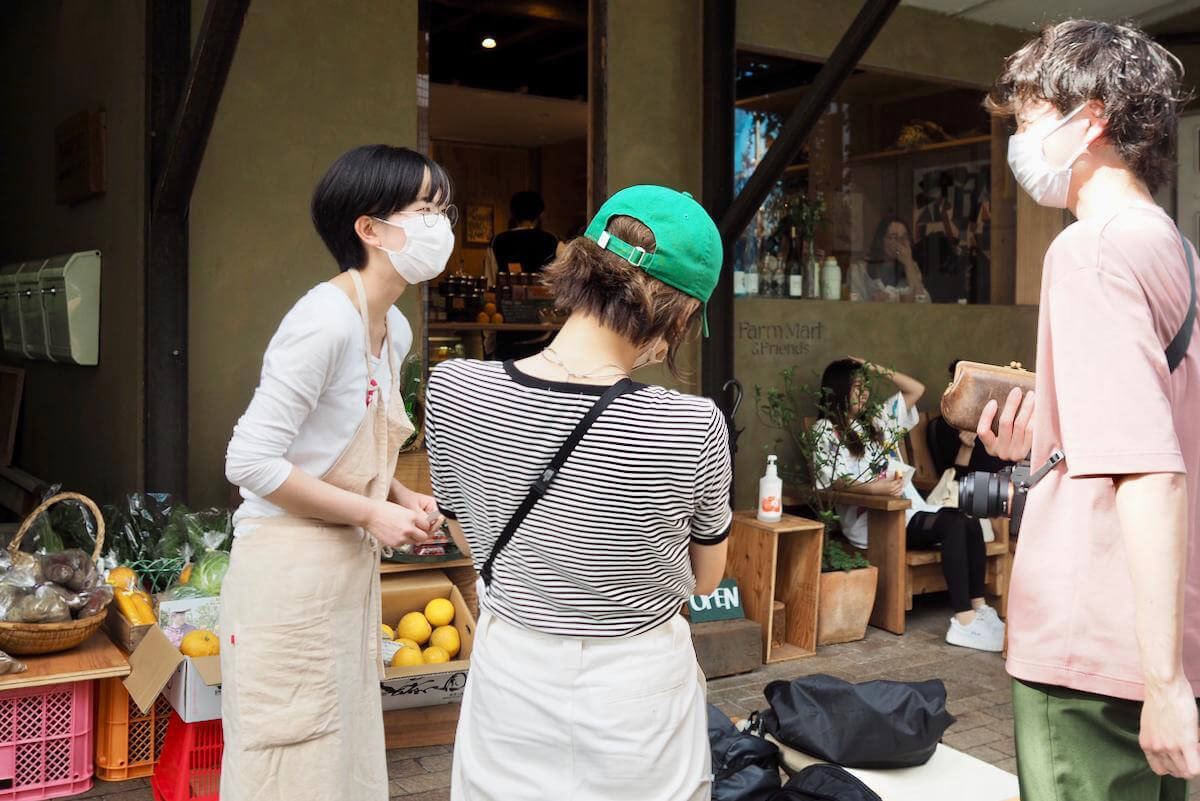
-- 前面に立つ人、後ろで支える人、両方必要ですよね。最後に、これから種本さんがお店で取り組みたいと思っていることがあれば教えていただけますか?
種本
基本的には、ご近所さんに日常使いしてもらえるお店として地道にやっていこうと思います。わたしたち自身が一番買い物していますから。そのうえで、ちょっとイベント的なことも企画していけるといいかなと思っています。つくり手さんを呼んでチーズをつくったり、夏はクラフトビールとタコスの会を開いたり、地域の団体と一緒に子どもたちにドーナツづくりを教えたり。来てくれる人も一緒につくっていくようなお店になったらいいなと思っています。
-- 楽しみです! お話を聞かせていただきありがとうございました。
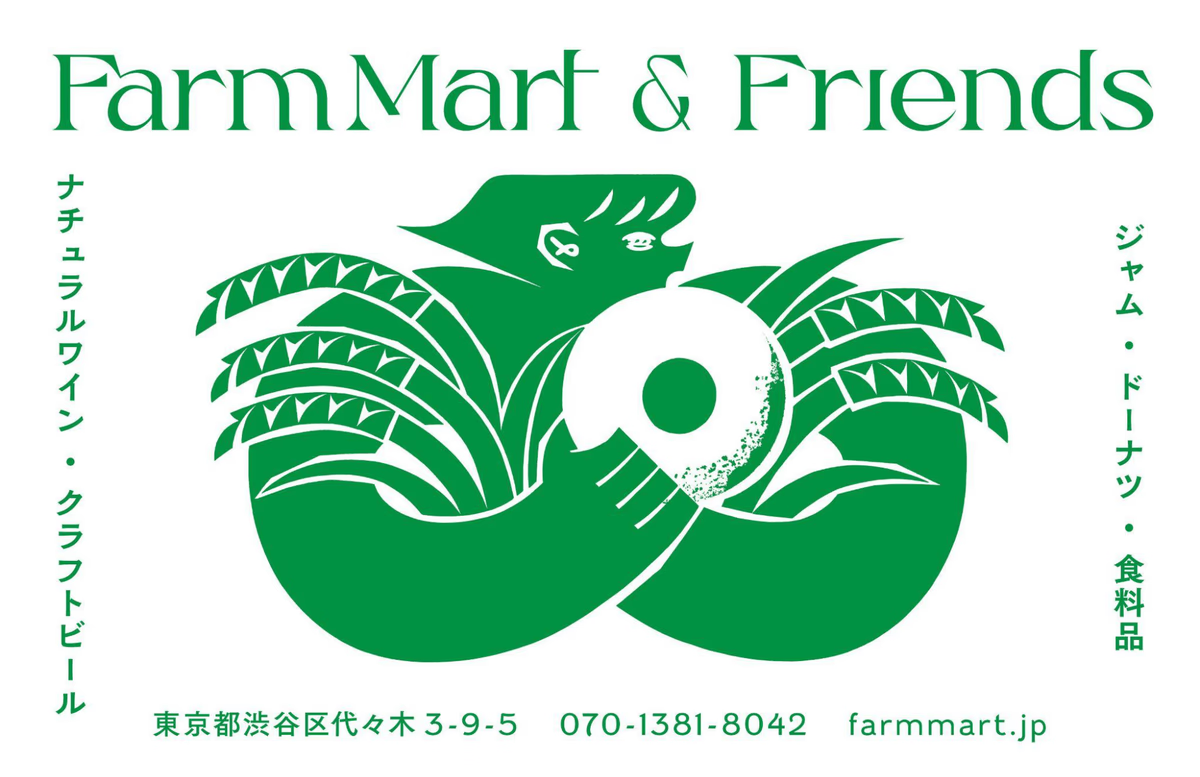
場所
東京都渋谷区代々木3-9-5
JR代々木駅、新宿駅から徒歩7分ほど
営業時間
平日 11:00 ~ 20:00
休日 11:00 ~ 18:00
定休日
水・木曜日 (祝日の場合営業 、翌日振替休日)
電話
070-1381-8042
Instagram
